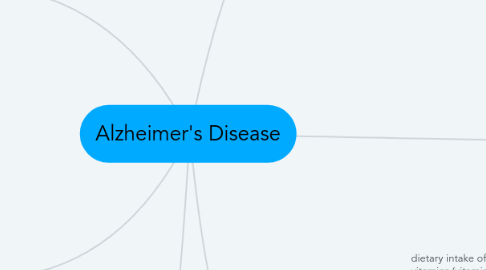
1. Genetic Details
1.1. Early onset, chromosomes 21, 14, and 1 are affected
1.1.1. chromosome 21 cause the formation of abnormal amyloid precursor
1.1.2. chromosome 14 causes abnormal presenilin 1
1.1.3. chromosome 1 leads to abnormal presenilin 2.
1.2. late-onset, having one form of the apolipoprotein E (APOE) gene on chromosome 19
2. Pathophysiological Etiology
2.1. Early onset mutation of amyloid-beta precursor protein (APP), presenilin 1 (PS1) and presenilin 2 (PS2)
2.1.1. Interstitial Plague formation
2.1.1.1. imbalance between the production and clearance of Aβ in the brain is the initiating event, ultimately leading to neuronal degeneration
2.2. Late onset attributed to allelic variations of apolipoprotein E (APOE)
2.2.1. Intraneuronal Neurofibrillary tangles
2.2.1.1. neurons in the transentorhinal region, spreads to the hippocampus and amygdala, and later to the neocortical association areas.
2.3. result of neuron dysfunction and cell death
2.4. cell-cycle abnormalities, inflammatory processes, oxidative stress, and mitochondrial dysfunction
3. Causative Factors
3.1. Brain changes
3.1.1. Neurofibrillary tangles
3.1.2. Beta-amyloid plaques
3.2. Ageing
3.3. Family history
3.4. hypercholesterolaemia, hypertension, atherosclerosis, coronary heart disease, smoking, obesity, and diabetes.
3.5. Head Injury
3.6. Down Syndrome
3.6.1. occurs in their 30's & 40's
3.7. Medications
4. Diagnostic Tests
4.1. Genetic testing
4.2. blood test identify APOE alleles, thyroid-function tests and serum vitamin B12,
4.3. SAGE Test
4.4. Neuroimaging, CT and MR
5. Common Findings
5.1. Early onset occurs before 65 years of age
5.1.1. Early stages, memory loss is mild
5.2. Late onset occurs after 65 years of age
5.2.1. Late-state loss of ability to carry on a conversation and respond to their environment
5.3. Europeans and Japanese are high risk
6. Treatments
6.1. dietary intake of homocysteinerelated vitamins (vitamin B12 and folate); antioxidants, such as vitamin C and E; unsaturated fatty acids; and also moderate alcohol intake, especially wine
6.2. No cure
6.3. Preventions
6.3.1. Control risk factors: HTN, DM & Stroke
6.3.2. avoid midlife stress
